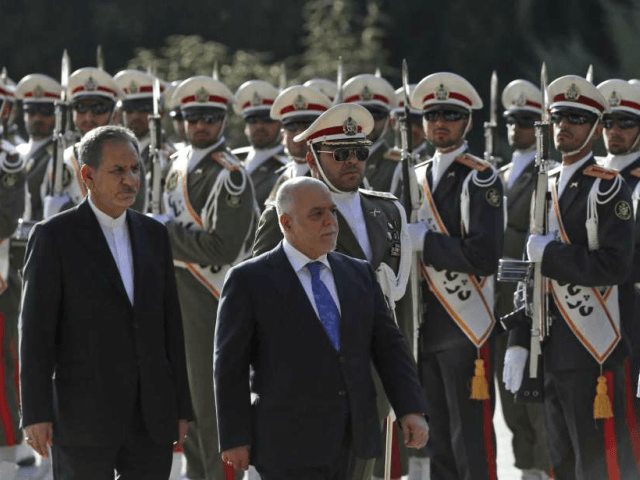The government of Iraq has rejected an offer from the Kurdistan Regional Government (KRG) to “freeze” the results of September’s referendum, in which over 90 percent of KRG residents said they would support secession from Iraq.
Prime Minister Haider al-Abadi said in a statement that the nation would “only accept only the canceling of the referendum and following the constitution,” according to the Iranian news outlet Tasnim (Abadi is in Iran this week to discuss supression of the Kurdistan region).
Since the release of Abadi’s statement, the KRG has complained of new military attacks in their territory by both the Iraqi military and Shiite, Iran-backed militias known as the Popular Mobilization Units (PMU or PMF). The PMU became legal wings of the Iraqi military this year in anticipation of the fight against the Islamic State in Mosul.
On Wednesday, KRG officials had offered a deal in which Erbil “froze” the results of the referendum in exchange for an end to the fighting. Specifically, the KRG offered three actions:
The immediate cessation of fighting and every kind of military operations in the Kurdistan Region.
Freezing the outcome of the referendum that was held in the Iraqi Kurdistan.
Beginning an open dialogue between the Kurdistan Regional Government and the federal government on the basis of the Iraqi constitution.
The KRG never clarified what “freezing” the referendum would mean, as the vote was always non-binding and meant to secure a mandate for dialogue. The KRG has maintained since long before the referendum happened that Kurdistan would never unilaterally secede from Iraq and prioritized dialogue with Baghdad to seek a welcome into the Mideast neighborhood as a sovereign state.
The KRG has, however, repeatedly refused to discard or erase the results of the referendum, insisting that the vote is a fair reflection of the will of its people.
In response, the Iraqi government branded the vote “unconstitutional,” rejected all attempts at dialogue, and has invaded Kurdish territory. It has since recovered the disputed region of Kirkuk—a multi-ethnic city that had been under Kurdish control since 2014, when the Iraqi army fled in the face of an incoming Islamic State (ISIS) attack. Without Peshmerga intervention, Kirkuk would have fallen to ISIS.
Iraq enjoys the support of all of its neighbors, except Israel, in attacking Kurdistan. The United States, formerly one of Kurdistan’s closest allies, has opposed the referendum and stood back as Iranian-supported militias attack one of the most effective forces on the ground against ISIS.
On Thursday, Abadi met with Iran’s Supreme Leader Ayatollah Ali Khamenei, who offered his support against the Kurds, claiming that the Kurdish referendum was a nefarious American/Israeli plot. Khamenei did not address the Trump administrations consistent opposition to the referendum, but he did warn Abadi that he believed that the United States created ISIS, a common allegation among Shiite jihadists.
“The Americans created Daesh [ISIS] themselves, but now that the terrorists have been defeated by the Iraqi government and people, they pretend to be supportive of this important development,” Khamenei reportedly told Abadi, according to Iran’s state-run PressTV. “However, they will undoubtedly not hesitate to harm Iraq again if they find the opportunity.”
In addition to Iran, Abadi has visited Saudi Arabia, Egypt, Jordan, and Turkey so far during his current regional tour, and met with American Secretary of State Rex Tillerson while he was in Saudi Arabia this week.
The Iraqi military and its Shiite allies began new attacks against the Peshmerga on Thursday. According to the Kurdish outlet Rudaw, Kurdish officials warned that PMU fighters had launched an attack near Mosul, the former regional capital of the Islamic State that the Kurds helped liberate:
STATEMENT: As of 1200hrs, Peshmerga repelled an four-pronged attack by ISF/PMF in NW Mosul. Shelling continues using heavy artillery. pic.twitter.com/8bDCiHoudh
— KR Security Council (@KRSCPress) October 26, 2017
The KRG condemned the United States in part for this attack, as the forces allegedly used American weaponry given to them to fight the Islamic State against the Kurds:
Frontline reporting confirms Iraqi forces and Iranian-backed PMF continue to use U.S. weapons given to Iraq for the anti-ISIL campaign, including Humvees, Armored Personnel Carriers and Badger infantry vehicles. This is a blatant violation of the Iraqi Constitution which forbids the use of the army to settle political disputes. We condemn Iraq’s military aggression in the strongest terms.
Iraqi Kurdish parties have warned that the use of force to expel Kurdish civilians from many of these areas could constitute ethnic cleansing or even genocide.

COMMENTS
Please let us know if you're having issues with commenting.